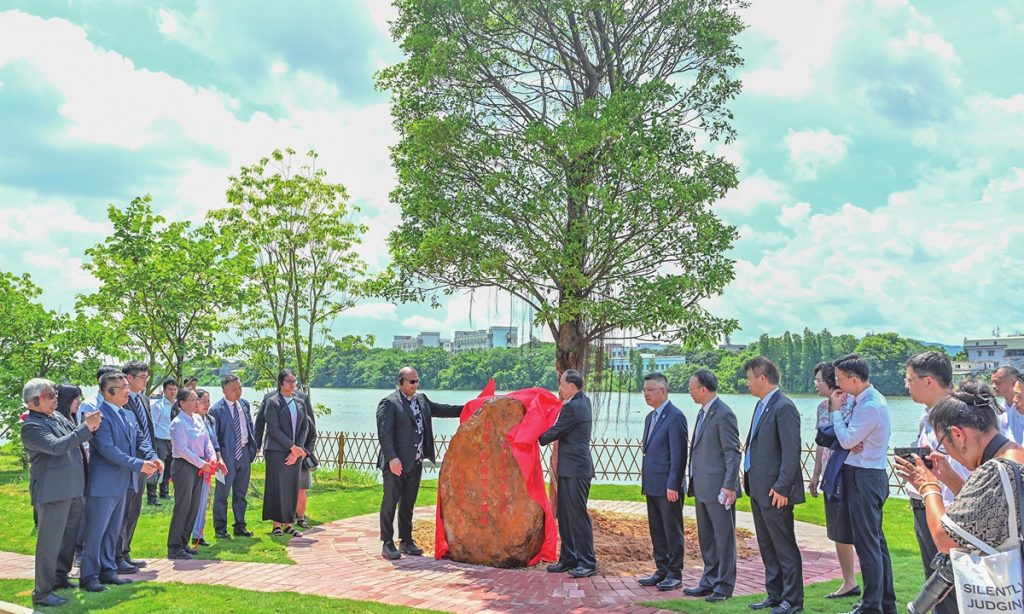Nauru president's tracing of family lineage in Guangdong strengthens people-to-people ties: expert

In a heartfelt journey bridging the past and the future, Nauruan President David Adeang returned to his ancestral roots in South China's Guangdong Province from Sunday to Wednesday, reconnecting with long-lost relatives and reaffirming the deep cultural and historical bonds between Nauru and the Pearl River Delta.
According to the China News Service on Wednesday, the four-day visit saw Adeang tracing his family lineage to Zhonggu village in Jiangmen, where his great-grandfather surnamed Situ embarked on a journey over a century ago that would eventually lead his descendants to the Pacific island nation of Nauru. The emotional homecoming, marked by tearful reunions, ancestral worship, and pledges for closer cooperation, underscores the enduring ties between China and Nauru, a Chinese expert said on Wednesday.
On Tuesday, Adeang, accompanied by his children and grandchildren, sat beneath a sprawling banyan tree in Zhonggu village, sharing lychees and longans with his 81-year-old relative, Tan Huixia.
"It is a tremendous honor to be warmly welcomed in my ancestral hometown alongside my aunt, children, and grandchildren. I sincerely hope to return frequently to visit the land of my roots," Adeang said, according to the media report.
Tan, still remarkably spry, handed him a handful of longans, a simple yet profound gesture of familial affection. "I'm overjoyed to see him," she said warmly, "and hope he can visit more often."
Earlier that day, Adeang and his family visited Su'an Julu, a historic ancestral hall blending Chinese and Western architectural styles, where generations of the Situ clan have gathered for worship and reunions. Climbing the newly restored stone steps, the Nauruan president led his family in traditional rites according to hometown customs - paying solemn tribute to their forebears with profound gratitude - before planting a banyan tree opposite the hall as a living testament to his family's enduring roots, China News Service reported.
At the Situ Clan Library, Adeang looked through the genealogical records and pointed excitedly at his own name upon discovering it.
While touring his hometown, the presidential delegation was greeted by enthusiastic crowds waving and shouting, "Welcome to Jiangmen!" Adeang warmly waved back and captured the town's scenery with his phone as mementos.
A highlight of the visit was Adeang's tour of the China Qiaodu Museum of Overseas Chinese in Jiangmen, where exhibits chronicled the struggles and triumphs of generations of emigrants from Guangdong.
Nauru, often called the "Paradise Island" of the Pacific, lies just 42 kilometers south of the equator. This coral atoll nation has become home to many Chinese immigrants, predominantly from Jiangmen in Guangdong Province and from Fujian Province, who have since become integral to Nauruan society, nfnews.com reported Tuesday.
"As president, I've visited many countries and tasted numerous cuisines, but this journey is truly unique and unforgettable," Adeang said. "I hope to return often and witness my ancestral hometown's continued prosperity."
On Monday, Huang Kunming, secretary of the Guangdong Provincial Committee of the Communist Party of China, met with Adeang in Guangzhou.
Huang said that the formal reestablishment of diplomatic relations between China and Nauru last year opened a new chapter in bilateral ties.
"Guangdong and Nauru enjoy close people-to-people bonds and a time-honored history of exchanges. Most Chinese descendants in Nauru, including President Adeang's ancestors, trace their roots to Guangdong," Huang said.
He remarked that Adeang's roots-seeking visit serves as a vivid testament to the blood ties between the peoples and will surely deepen bilateral exchanges and cooperation.
"Within the framework of China-Nauru friendship, we will further facilitate personnel exchanges, consolidate and expand cooperation in infrastructure, healthcare, cultural tourism and other fields, make good use of our abundant marine resources, and explore various forms of cooperation such as joint marine ranching, deep-sea fishing, mariculture, and advanced fishery processing," Huang added.
Adeang reaffirmed Nauru's commitment to the one-China principle and praised China's global initiatives, which he said have garnered strong support across the Pacific. "Enhancing cultural exchanges is vital to our bilateral relationship," Adeang noted.
As Adeang's journey concluded, a Chinese analyst highlighted its broader significance. "This visit is about rekindling kinship and fostering grassroots exchanges," Chen Hong, director of the Asia Pacific Studies Centre at East China Normal University, told the Global Times on Wednesday. "Shared heritage can be the foundation for sustainable cooperation," Chen said.
According to Chen, historically, many Pacific Islanders maintained close ties with China's Guangdong, Fujian and Taiwan regions. Early waves of Chinese migrants settled across Pacific Island nations, followed by generations of entrepreneurs establishing businesses. "These historical connections have created a community with a shared future between China and Pacific Island countries, forging enduring bonds," Chen said.
Chen remarked that such down-to-earth exchanges hold irreplaceable value in improving Pacific Islanders' understanding of China, noting that future initiatives like ancestral hall restorations and genealogical archives could foster youth exchanges.